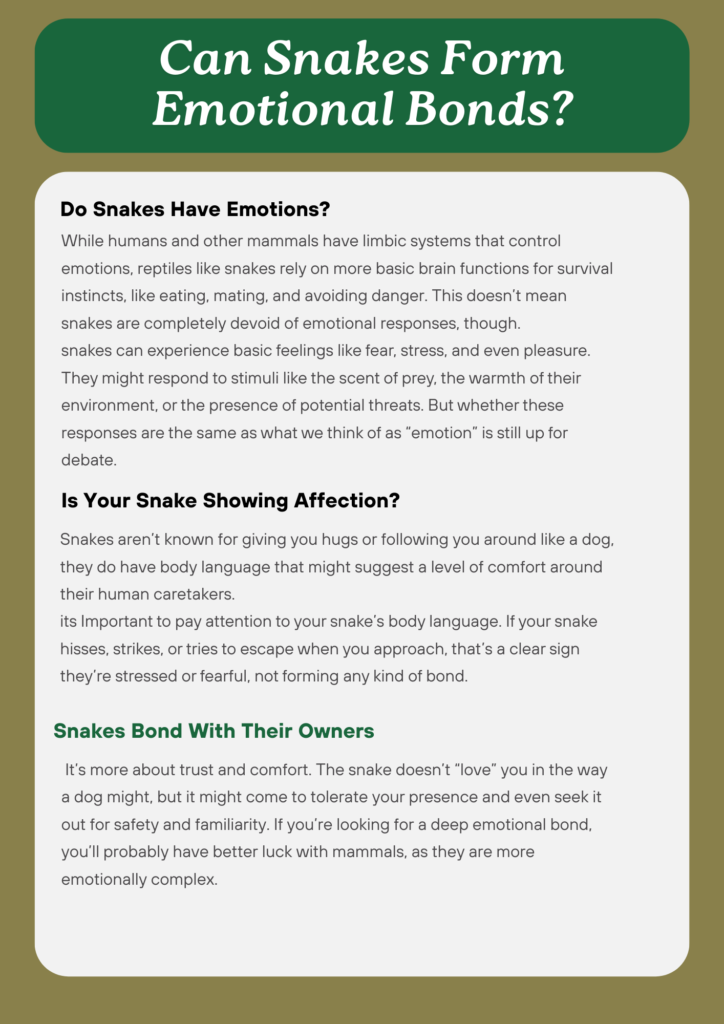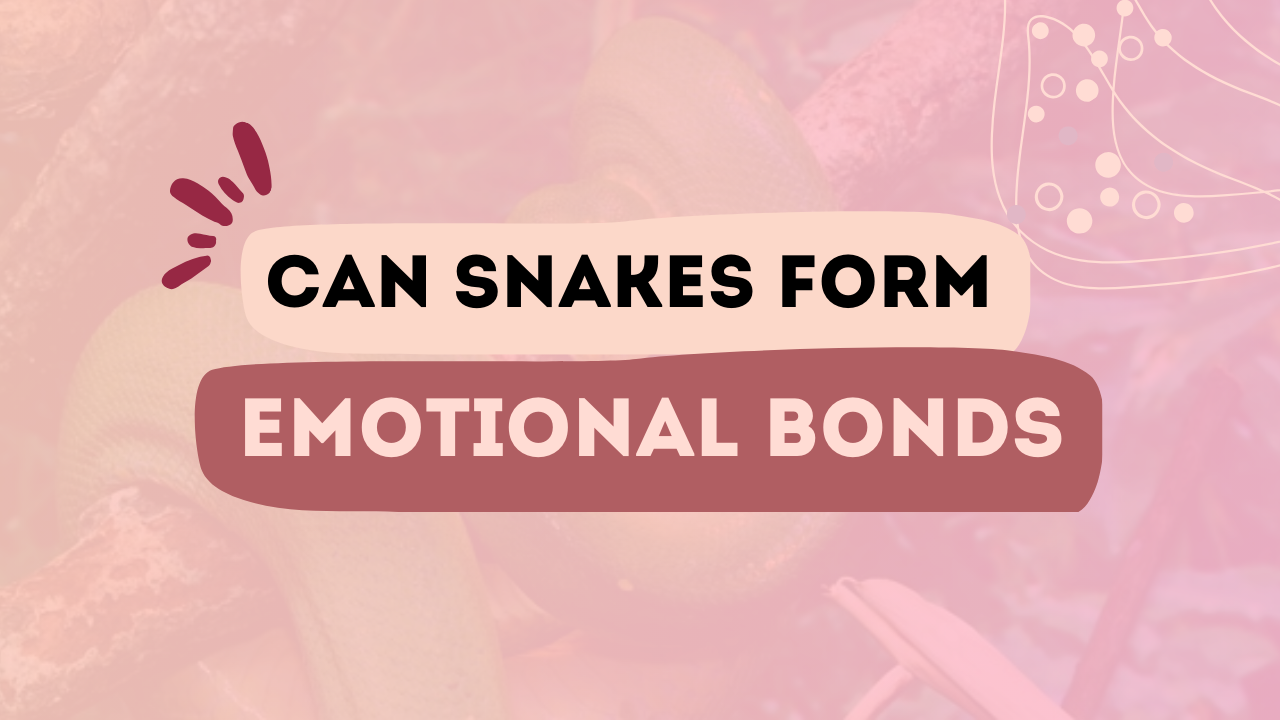When it comes to pets we often think of loyal dogs, cats, or even friendly rabbits. But what about snakes? Can Snakes Form Emotional Bonds?
If you’re a snake lover or even someone who’s curious about them, you’ve probably wondered whether your pet snake recognizes you, feels attached to you, or maybe even looks forward to interactions with you.
Snakes are often seen as cold-blooded, mysterious creatures that are hard to read, so it’s natural to ask: Can snakes form emotional bonds? While the idea of an emotional connection between a snake and a human might seem strange to some, there are fascinating aspects of reptile behavior that suggest they might, in their own way, form attachments. Let’s dig into it!
Do Snakes Have Emotions?
Before we dive into whether snakes can form emotional bonds, let’s talk about something important—do they even have emotions? Well, kind of, but not in the same way humans do. Snakes, like many reptiles, have a simpler brain structure compared to mammals.
While humans and other mammals have limbic systems that control emotions, reptiles like snakes rely on more basic brain functions for survival instincts, like eating, mating, and avoiding danger. This doesn’t mean snakes are completely devoid of emotional responses, though.
For instance, snakes can experience basic feelings like fear, stress, and even pleasure. They might respond to stimuli like the scent of prey, the warmth of their environment, or the presence of potential threats. But whether these responses are the same as what we think of as “emotion” is still up for debate. Unlike dogs or cats, who can show clear signs of affection, snakes don’t wag their tails or purr when they’re content. Instead, their reactions are more subtle.

Can Snakes Recognize Their Owners?
Okay, so snakes might not have emotions like we do, but can they recognize their owners? You’ve probably heard of people having pet snakes that seem to know when it’s time to eat or get attention. Some snake owners believe their pets remember them and get excited when they see them. But here’s the thing: snakes don’t have the same memory or social bonds as mammals, so it’s more likely that your snake is responding to consistent cues—like the sight of food or the presence of your scent—rather than forming a deep emotional connection.
That said, there are some behaviors that suggest snakes can form some kind of attachment to their owners. For example, some snakes will react more calmly or even seek out their handlers for interaction. Ball pythons, for instance, have been known to be more relaxed when handled regularly. If a snake feels comfortable with its environment, it might seek out familiar humans for a safe interaction, but this isn’t necessarily the same thing as forming a true emotional bond.
Body Language: Is Your Snake Showing Affection?
While snakes aren’t known for giving you hugs or following you around like a dog, they do have body language that might suggest a level of comfort around their human caretakers. For example, a snake that curls up on your lap, stays still when being handled, or enjoys the warmth of your hand might not be emotionally attached in the same way a dog would be, but they are showing trust and comfort. Snakes are more likely to stay still and “enjoy” the interaction if they feel safe with you.
It’s important to pay attention to your snake’s body language. If your snake hisses, strikes, or tries to escape when you approach, that’s a clear sign they’re stressed or fearful, not forming any kind of bond. On the other hand, if your snake is relaxed and calm during handling, it could be a sign they’ve gotten used to you and see you as a safe presence.
Stress and Anxiety in Snakes
Snakes, like any other animal, can experience stress and anxiety. In fact, reptiles are often more sensitive to changes in their environment than mammals. If your snake is constantly showing signs of stress, such as refusing food, hiding excessively, or acting aggressively, it could be due to factors like poor handling, an unsuitable habitat, or unfamiliar surroundings.
Interestingly, some owners believe their snakes show a sort of attachment by becoming less stressed when their regular handlers are around. This could be because the snake feels more secure with a familiar presence, but again, this is different from the emotional bonds we see in more socially oriented animals.
How Snakes Bond With Their Owners (Or Do They?)
So, can snakes form emotional bonds? Well, the answer is a bit complicated. Snakes don’t form emotional bonds in the same way that dogs or cats do, but they can still become familiar with their owners. Reptiles, especially snakes, are more likely to bond through consistent, non-threatening interactions. They may learn to recognize their caretakers based on scent, routine, or even the way they are handled. If a snake feels safe and comfortable in your presence, they might become more relaxed and tolerate interaction.
That said, this behavior shouldn’t be confused with affection. It’s more about trust and comfort. The snake doesn’t “love” you in the way a dog might, but it might come to tolerate your presence and even seek it out for safety and familiarity. If you’re looking for a deep emotional bond, you’ll probably have better luck with mammals, as they are more emotionally complex.
The Role of Habitat and Care in Building Trust
A big factor in how well your snake interacts with you is how well you care for its needs. Snakes are sensitive creatures, and their behavior can change based on their environment. If your snake feels safe, healthy, and well-cared for, it’s more likely to be relaxed when you interact with it. Regular feeding, proper temperature regulation, and appropriate handling are all key to ensuring that your snake is comfortable and trusts you.
Creating a positive environment for your snake can help form a bond based on trust. Over time, if you are consistent and patient with your snake, you might find that it becomes more relaxed and receptive to handling, though this still isn’t quite the same as emotional attachment.
Conclusion: A Complex Relationship
So, can snakes form emotional bonds? It seems that they can, but in their own unique way. While snakes don’t experience emotions in the same way as humans or even dogs, they can certainly form attachments based on trust, comfort, and familiarity. If you’re hoping for a snake that shows affection or loves you like a dog does, you might be disappointed. But if you understand that a snake’s bond is more about security and recognition, you might find yourself enjoying a surprisingly unique and rewarding relationship with your slithery friend.
In the end, whether or not snakes can form emotional bonds comes down to understanding their behavior and what it means to them. They may not be the cuddly companions you’ve dreamed of, but with time, patience, and care, your snake can still develop a relationship with you that is built on trust and respect.

